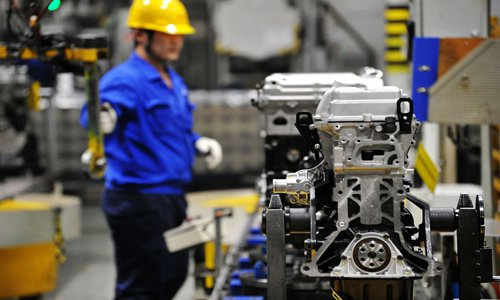HOME >> BUSINESS
General Motors lets short-term profit trump no-emissions goal despite appearances
Source:Global Times Published: 2019/10/31 19:38:40

Photo: IC
General Motors (GM) and Toyota Motor are among the major automakers making a song and dance about their commitment to reducing emissions. The $225 billion Japanese manufacturer was a pioneer of mass-market hybrid cars with its Prius lineup; it's also trying to develop hydrogen fuel cells. GM, meanwhile, is talking about its commitment to zero emissions, along with zero crashes and zero congestion. But on Monday both decided, along with Fiat Chrysler Automobiles and Hyundai Motor, to back a White House push to strip California of its right to set its own tailpipe-emissions standards.The four, along with a couple of lobby groups, are pitching the matter as merely a legal issue, with only Washington, DC setting emissions standards. The Golden State wants to push ahead with rules to improve the average fleet fuel economy to some 47 miles per gallon, whereas US President Donald Trump's administration wants to reduce average fuel efficiency to 37 miles per gallon. Ford Motor, Honda Motor, Volkswagen and BMW, as well as 22 states, have already sided with California.
It's true that companies benefit from clear, settled regulation. Having to meet a variety of different standards in different parts of the same country increases complexity and cost. Sensible federal rules for such things are the better answer, all other considerations being equal. That doesn't wash in this instance, though. For starters, there are short-term financial incentives at play. The highest-margin products automakers sell are gas-guzzling, high-emissions SUVs and light trucks. They can sell more of them if on average they only have to hit the White House's lower fuel-economy target than the Barack Obama-era rule that California is keeping alive.
SUVs and the like helped the $55 billion GM increase its third-quarter earnings by 6 percent before interest and taxes compared to the same period last year, the company revealed on Tuesday, despite a debilitating strike by workers. And they ensured the company run by Mary Barra posted a healthy operating margin of 10.2 percent in North America.
That ought to put GM in a strong position to take the lead on better battery technology to reduce reliance on ozone-depleting fossil fuels. Monday's decision, though, shows executives are delaying GM's non-polluting future as long as possible.
The author is Antony Currie, a Reuters Breakingviews columnist. The article was first published on Reuters Breakingviews. bizopinion@globaltimes.com.cn
Posted in: INSIDER'S EYE